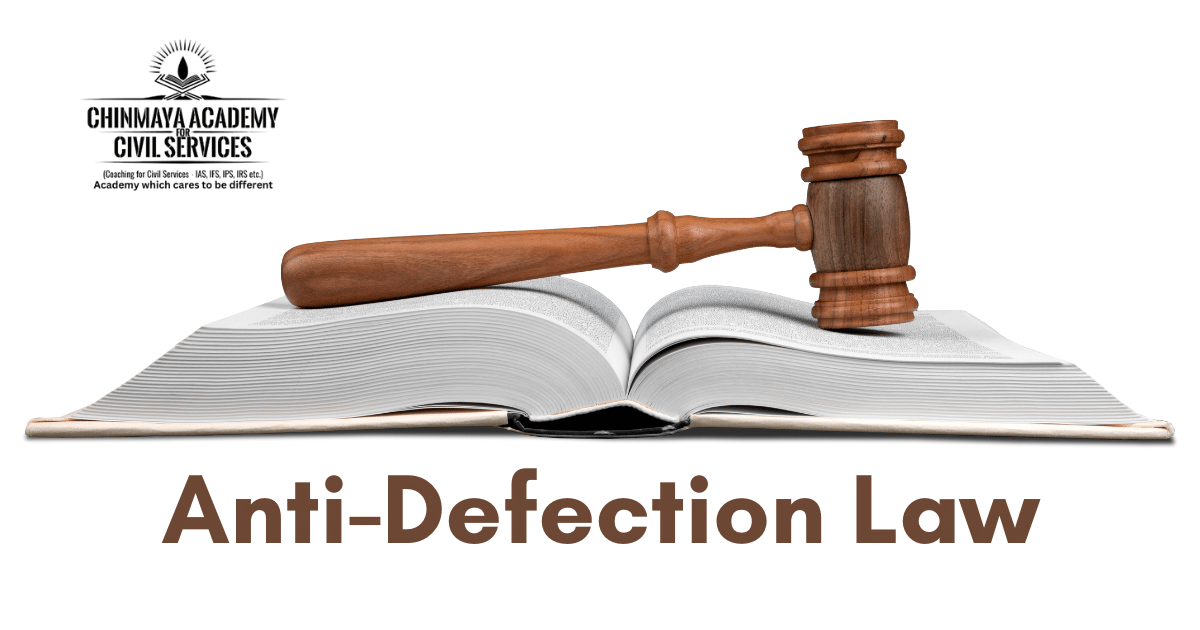
Purpose – Prevent lawmakers from defecting politically.
By virtue of the 52nd Amendment Act of 1985, the Tenth Schedule—also referred to as the Anti-Defection Act—was added to the constitution. It establishes the guidelines for disqualifying elected officials for defecting to a different political party. if a legislator or political party member voluntarily resigns from office.
Provisions
- If he votes or refrains from voting in such a house, opposed to any guidance issued by his political party or anyone approved to do so, without getting prior permission.
- His party or the designated person must not accept his not voting within 15 days of the incident as a condition for his disqualification.
- if a member who was elected independently decides to join a legislative party.
- if a member who has been nominated after six months joins a political party.
- It does not, however, penalise political parties for endorsing or admitting legislators who defect, nor does it prohibit a group of MPs or MLAs from joining (i.e., merging with) another political party.
- A “defection” by one-third of the selected members of a political party was considered a “merger” under the 1985 act.
- However, this was changed by the 91st Constitutional Amendment Act of 2003, and as of right now, a “merger” must have the support of at least two-thirds of a party’s members in order for the legislation to recognise it.
- Members who are legally disqualified may run for office in the same House from any political party.
- The Chairman or Speaker of that House will decide whether to disqualify someone for defection; this decision is subject to “judicial review.”
- The statute, however, does not specify how long the presiding officer has to make a decision in a defection case.
91st constitutional amendment Act 2003.
- The Central Council of Ministers’ total membership, including the Prime Minister, cannot exceed 15% of the Lok Sabha’s total membership.
- A member of any political party in either House of Parliament who is disqualified due to defection will also be ineligible to be appointed as a minister.
- The entire number of ministers in a state’s Council of Ministers, including the Chief Minister, cannot be more than 15% of the Legislative Assembly’s total membership. However, a state’s total number of ministers, including the Chief Minister, cannot be fewer than twelve.
- A state legislator from any political party who is disqualified for defection in either house of the legislature is also ineligible to be appointed as a minister.
- A political party member who is disqualified for defection from the House of Commons or the House of a State Legislature is also ineligible to hold any paid political position.
- The Tenth Schedule (anti-defection law) no longer contains the clause that states that a split by one-third of a legislature party will exempt the member from disqualification. It implies that there is no longer any protection for defectors based on splits.
Why is the Anti-defection law under criticism?
- India’s anti-defection law has drawn criticism from a number of sources. The following are some of the primary objections to the law:
Reducing dissent: Legislators’ freedom to follow their conscience, defend their convictions, and represent their constituents’ interests is violated by the law. - Lack of Intra-Party Democracy: Parties are strongly motivated by the law to maintain control over their members and to punish those who deviate from the norm by punishing defectors. This could deter lawmakers from criticising party leaders or bringing up contentious issues within the party.
- Parties Split: Politicians may create new parties or join smaller ones that already exist in order to avoid losing their political standing. This causes the parties to split apart. Parties may find it more difficult to establish stable governments and carry out policies successfully as a result.
- Representative democracy is being undermined by the misuse of the law for political purposes. Threats of defection have been used by political parties to punish members or force them to endorse particular candidates or policies. This could erode public confidence in the political system and jeopardise the integrity of the political process.
- Speaker’s controversial role: The law has drawn criticism for being opaque and ambiguous. The law’s provisions are ambiguous, and the Speaker’s or Chairman’s decision regarding a defection is final and cannot be contested in court. The process’s fairness and impartiality have come into question as a result of the lack of openness and judicial supervision.
What are the suggestions to reform the Anti-defection law in India?
Numerous proposals have been made to amend India’s anti-defection legislation. Among the suggested reforms are the following:
- Second ARC: The President or Governor, acting on the Election Commission’s recommendation, should decide whether to disqualify members for defecting.
- Cutting down on the quantity of defectors: It is recommended to increase the disqualification threshold from one-third to two-thirds or three-fourths. As a result, fewer people would defect, and political parties would find it more difficult to split.
- Permitting defections under specific conditions: Some have proposed allowing defections under specific conditions, like when a political party merges with another party or when a member is kicked out of their party.
- Eliminating the Speaker’s role: Some have proposed replacing the Speaker’s decision-making authority in cases of disqualification with an impartial body, like the Election Commission.
- Independents should not be disqualified from joining political parties, according to some who have advocated for this policy.
- Creating a grace period: According to some, members who have defected should have a grace period to demonstrate their loyalty to their new party.
- Time frame: The Speaker of the Legislative Assembly must make a decision on a petition to remove a member from office under the Tenth Schedule of the Constitution within three months, according to one of the Supreme Court’s rulings.
 Chinmaya IAS Academy – Current Affairs Chinmaya IAS Academy – Current Affairs
Chinmaya IAS Academy – Current Affairs Chinmaya IAS Academy – Current Affairs
